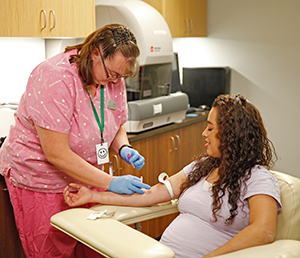Facts about hypothyroidism and pregnancy
Hypothyroidism is a condition that is caused by an underactive thyroid gland. It may happen during pregnancy. Many symptoms of the condition are similar to pregnancy symptoms. For example, they can both cause fatigue, weight gain, and changes in menstruation. Having low thyroid hormone levels can also cause problems with becoming pregnant. It can also be a cause of miscarriage, as well as raising the risk for a cesarean birth and increased bleeding after delivery.
What are the symptoms of hypothyroidism?
Hypothyroidism is a common condition. The thyroid doesn't make enough thyroid hormones. Symptoms may be mild and may start slowly. It can go undetected if symptoms are mild. The most common symptoms include:
-
Feeling tired.
-
Depression.
-
Inability to stand cold temperatures.
-
Hoarse voice.
-
Swelling of the face.
-
Weight gain.
-
Constipation.
-
Skin and hair changes, including dry skin and loss of eyebrows.
-
Brittle nails.
-
Carpal tunnel syndrome (hand tingling or pain).
-
Slow heart rate.
-
Shortness of breath with activity.
-
Muscle cramps, weakness, joint pain.
-
Trouble concentrating.
-
Irregular menstrual periods.
The symptoms may be like other health problems. Talk with your health care provider for a diagnosis.
How does hypothyroidism affect the baby in the womb?
During the first few months of pregnancy, the baby relies on the mother for thyroid hormones. These hormones are vital for normal brain development and growth of the baby. Hypothyroidism in the mother can have long-lasting effects on the baby.
How is thyroid function tested?
You will have blood tests that measure thyroid hormone (thyroxine, or T4) and serum TSH (thyroid-stimulating hormone) levels. TSH levels that are above normal and T4 levels that are below normal may mean you have hypothyroidism.
Who should have thyroid function testing?
Routine screening for hypothyroidism during pregnancy is not advised. You should be tested if you are pregnant and have symptoms of hypothyroidism, are having difficulty becoming pregnant, or are early in a course of in vitro fertilization. Also, if you have a history of the condition, or other endocrine system conditions. The American Thyroid Association recommends that all pregnant women in the U.S. supplement their diet with 150 mcg of iodine in the form of potassium iodide. This is the amount often found in prenatal vitamins. If possible, begin taking this supplement 3 months before becoming pregnant. (This doesn't apply to women already taking thyroid hormone for hypothyroidism.)
How is hypothyroidism treated during pregnancy?
Thyroid hormone replacement is used to treat the mother. The amount of thyroid hormone given is based on the mother's levels of thyroid hormones as well as her symptoms. Thyroid hormone levels may change during pregnancy. The hormone replacement dose will likely change over time. Thyroid hormone levels need to be checked every 4 weeks in the first half of pregnancy. The levels may be checked less often during the second half of pregnancy as long as the dose does not change. The treatment is safe and vital to both mother and baby. Thyroid hormones should not be taken at the same time as prenatal vitamins. This is because the minerals in the vitamins may stop the absorption of the thyroid hormone. All newborns are screened at birth to check thyroid hormone levels.
Featured in


